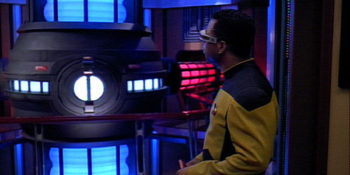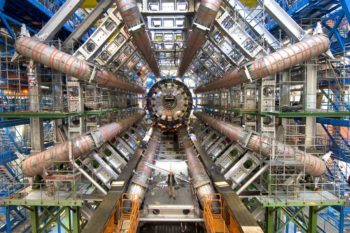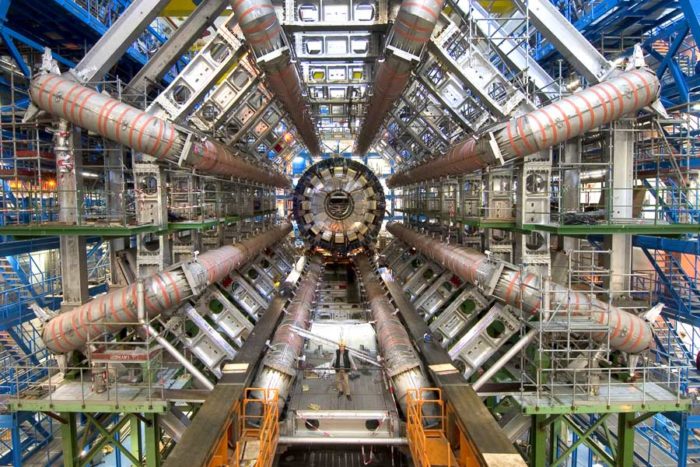The Car-Universe Without A Motor, part 4: The Half-Hill of Particle Physics
This post looks at the formation of basic particles after “cosmic inflation,” which is thought to have happened (by the majority of cosmologists today) very quickly after the Big Bang began. We’ll look at particles using minimal detail, because even though the topic certainly poses serious problems for the idea that the universe “naturally” generated itself, we are going to grant this entire point for the sake of being as reasonable as possible. Though it’s still worth touching on, because it helps us talk about what is and what is not a “natural” universe.
In the last post in this series we started out supposing for sake of argument that the matter/energy at the beginning of time (as seen in the Big Bang model of the universe) and the laws of nature believed to have guided the development of that matter and energy through a supposedly natural process of cosmic evolution, just happened. Just because.
Then we challenged the presumption behind the cosmic inflation that is supposed to have happened next, doubting that it naturally would lead to the universe we have. Because it would not, as explained by Roger Penrose in his book Cycles of Time.
So what’s next in the movement of our universe from where it began to where it is now, is that it’s thought to have been extremely hot right at first, too hot for particles of matter (or energy) to form. After less than a second of cooling, they began to take shape. Note that the laws of physics as we understand them today do allow for a massive surges of energy to spontaneously become particles with mass–though this has only partially been reproduced in physics experiments.
But the laws of physics as we know them also indicate that the process should produce equal amounts of matter and antimatter.

Matter meets antimatter in the Enterprise’s warp core.
Matter and antimatter destroy each other on contact, releasing massive doses of energy (which is one of the technical things Star Trek gets right–though you don’t need fictional “dilithium” to guide the matter/antimatter reaction). And if the known laws of physics randomly generate equal amounts of matter and antimatter, uh, oops…I guess the universe should have ended with another bang about a second after the “big” one, leaving us with mostly photons (light and other particles without mass) and only a relatively few randomized particles of about equal amounts of matter and antimatter–those which by coincidence happened to be far enough from one another not to hit each other and blow up. No planets. No stars. No me and no you.
Of course particle physicists and cosmologists know about this problem. They’re searching for an answer to it. Note though that they don’t for the most part tell the public that since almost the entire known universe is made of matter and only a very tiny amount is antimatter, that makes the concept of a self-generating universe even more improbable than it otherwise would be. (That’s a conclusion I draw and they don’t, but it’s a fair one, based on the data scientists use themselves.)
The problem does however indicate something to them–that their ideas concerning the laws of physics must be wrong. There must be a principle not accounted for in the version of physics called “the Standard Model,” a principle which makes matter more likely than antimatter, to explain how the universe turned out as it did. So the search is on for why the Standard Model is wrong (as they are sure it must be) in order to explain this discrepancy and other problems.
One of the other problems is the Standard Model is “inelegant,” requiring 19 different numerical constants whose values are unrelated in order to function and which give every appearance of being arbitrary. That is, nothing within the Standard Model itself requires the constants to be what they are. Which means they could in theory be different. And if any one of them were different, it would make the formation of matter as we know it–and life–you and me–utterly impossible from what I read on the subject (from particle physicists themselves). Which, if you are familiar with Intelligent Design at all, is an argument frequently used in favor of God, that he fine-tuned the laws of nature to allow the universe to be what it is.
Please note that as far as any human being knows, you can have a universe start out with the matter in the Big Bang and have a set of laws of physics and still not get ones that would produce matter as we know it–or ones that prefer matter over antimatter. In that case, getting the universe we have of its own accord would require things turning out just right via random chance, of highly improbable events just happening to come true, events much more improbable than you winning the lottery every single day for the rest of your life.
Since I did say I would concede the laws of physics and the matter/energy at the Big Bang and only challenge what is supposed to happen after that, I will grant to those who think the universe generated itself, not just laws of physics but these laws of physics, not just matter, but matter without too much antimatter, guided by some mysterious unknown process. So I will basically drop this argument. In my metaphor of a car going up- or downhill, let’s call this problem a half-hill. A hill, yes, but for sake of argument, one the car-universe can arguably swerve around.
Note though the attitude of the particle physicists on this topic. They expect if the particles of nature are what they are, there ought to be an underlying cause for them to be that way. Something that links the 19 constants and explains why their relationship to one another is what it is. Something that also explains gravity (which the Standard Model does not really do). And the matter/antimatter discrepancy (and other issues as well).

The LHC: Photo credit: Maximilien Brice, CERN
This more basic reason for things being what they are (this quest for a lack of fine-tuning) is what particle physicists call naturalness. String Theory is one of a number of theoretical approaches to solving this, in effect figuring out the answer to why the universe does not seem to follow the principles of “naturalness.” Some versions of String Theory have already been tested by the Large Hadron Collider (LHC), which started running in 2008. As the linked New York Times article (from 2017) explains, so far the tests have shot down ideas which were supposed to bring a the kind of logical order (a.k.a naturalness) to particle physics that these scientists crave (though some versions of these ideas the LHC is incapable of testing).
In fact, the most notable discovery from the LHC is the confirmation of the existence of the Higgs Boson in 2012, which was predicted by the Standard Model. So far, the Standard Model stands up to scrutiny and all competitors have failed. This could change in the future, of course. It could be another form of physics is found, one that answers all riddles, one that starts with a basic mathematical formula that accounts for all the other phenomena in the universe, from particle physics to cosmology.
I don’t think that will ever happen, but I will grant for sake of argument it could happen. But it hasn’t happened yet. So far, the universe appears to be unnatural, based on the way particle physicists talk about naturalness. The car in my metaphor very definitely runs uphill (I haven’t even covered all the hills yet).
And that observation on the universe seeming “unnatural” is based on the very latest in scientific discoveries–progressing science making a self-generating universe seem less likely than it seemed before, rather than more likely.
If that’s the case, if scientific progress actually has arguably rendered gradually less support over time for a self-producing creation (and it has done so for a least the past century), why do people talk as if the opposite were true? As if advancing science is continually showing how any reference to God is increasingly unnecessary to explain the universe we inhabit?
I’d say the reason why is based in a bit of history which I’ll discuss in the next post.
But in the meantime, what are your thoughts on this topic? Please share them below.










































This is excellent content. Thanks for this post.
I am familiar with the issues raised regarding the Standard Model and the current cosmological crisis. I have had many of the same thoughts as you: “things are not adding up,” etc. and that there is a degree of double-speak and glossing over of unsaid implications in the popular presentation of current physics and cosmology research.
Having said that, I am also aware of the annoyance physicists feel (particularly the Atheists) in the response of believers to the problems they encounter in their modeling of the Universe. From their point of view, we are like the kid with an imaginary friend whom we use to answer anything that happens in the neighborhood that is unexplained. Trash can knocked over? Fred did it. Flowers in the flowerbed torn up? It was Fred.
As non-physicists, we are unqualified to actually judge the veracity of the information they present us with. And it is to their credit that they present their anomalies to the public even knowing how a necessarily ignorant public will misconstrue and run with them. We are dependent on the scientists themselves for these models, contradictions, and anomalies. I can certainly see some of them griping: anything we don’t have an answer for they say comes from God.
And then, of course, when a physical answer emerges, we have the phenomenon of the ‘retreating God.’ etc. One of the stronger objections Atheists have to resorting to God for causalities, etc.
None of which invalidates the rather tantalizing possibility that the terms of the debate may someday change; that the physical sciences will continue to answer its own questions, with God retreating and retreating and retreating…until God stops retreating, and there emerges from the latest cosmological theorizing a mathematical model that not only requires God, but demonstrates part of what God does to the Universe, and perhaps why. And I think we should not mistake that this is on everyone’s mind, Believer and Atheist alike. [And not all physicists are Atheists, by any means, btw.]
What will happen on that day, I wonder.
Democritus posited that all matter consisted of tiny invisible atoms that were irreducible. For more than two-thousand years his hypothesis was untested and untestable, dismissed by the philosophical and emergent scientific consensus. And then, in the 19th Century, he was proved right.
This post exemplifies a positive and informed Christian engagement with Science. There is so much noise, ignorance and misconceptions among believers about the nature and methods of Science and Scientific Discovery. I hope to see more posts like this in the future.
Thank you so much for your positive comments. I do disagree with some of what you say, though.
First, I think not only can I evaluate what physicists say about the universe, I believe I really ought to do so. While that puts me in the position of reading many experts and weighing the opinions of certain ones over others based on things like their consistency and clarity–and also leads to me staring hard at equations whose mathematics goes above any training I’ve had in mathematics in an effort to understand them–I think the effort to understand is inherently valuable. Or to put it another way, I think God rewards the effort put into understanding the nature of reality. Well, God rewards effort as a general rule, no matter what the subject, but I think God has revealed much about the nature of the universe to people who not only had the talent to understand it, who worked at it, but also to those who sought God’s help in understanding, at least in some cases. If God is real, he is indeed able to “give grace to the humble,” as the Scripture says–though a point of view that assumes there is no God of course does not allow for any form of Divine help.
Second, I think the idea that the understanding of the universe is continually advancing is a false one. If you look at how many pieces of information which puzzled scientists in, say, 1900, there was precious little they felt science had not explained. The precession of the perihelion of Mercury being other than what Newtonian gravity and laws of motion predicted being one of the few things scientists were scratching their heads over. Within 20 years or so, the universe sharply had become much more mysterious with the revelation of the realities of Relativity and Quantum Mechanics. These two things, Relativity and Quantum Mechanics, are in fundamental contradiction with one another on some very important levels. And this contradiction has not been solved in the past century or so, not at all.
Following this up was the discovery of a universe that appears to originate from a single point, the Big Bang. While that’s very cool and interesting, it causes loads of serious problems. The inflation of the universe does not make sense as commonly presented–and it’s not me that said that, it’s Roger Penrose, whom I judge to be be telling the truth about the issue. (He is detailed and specific on his ideas and he shared a lot of math in Cycles of Time–those who disagree with him don’t answer his points very well from what I have read. That’s what leads me to believe he is right and they are wrong.) Plus there are the serious problems stemming from Dark Matter and Dark Energy–substances which were totally unknown in 1900. And other issues.
Though the precession of the perihelion of Mercury has been figured out (by relativity), far more things are known to be unknown today than in 1900. We could declare that’s a sign of progress, that at least we have a good grasp on what he don’t know now and we perhaps we will soon solve all the problems. Perhaps 1000 years from now (I can say for the sake of argument) science will look back at this time of confusion as a mere blip on the way to ever grasping more and more. But that’s not the situation NOW. The “unknown” column has grown faster than the “known” column in the past 120-so years. That isn’t a matter of my mere unthinking opinion. I say this based on facts, based on things the scientists involved in studying the universe have written. The universe is less and less explained in many key ways over time, not more and more.
And we may not even have really identified what the actual “unknowns” are. It’s a conceit that presumes scientific progress to assume that we won’t (as a race) continue to find the universe continually more and more inexplicable. As opposed to being able to boil everything down to a few simple principles–which is what scientists hope to do.
So you could say (and did say) my post represents positive and informed Christian engagement with Science. I would say on the other hand it represents a serious effort to understand Science over decades of reading and thinking (and praying) about what the universe is actually like. Doing so, I have taken science seriously, believing that scientists do valuable work, even if they sharply disagree with a religious view of what the universe is like and what that means.
What I have learned, I am sharing with others. I’d be happy to engage actual scientists on this topic, though I have not done so thus far. (Unless you are a scientist yourself, Callen.)
Yes, I will keep writing about what I have learned (God willing) and do so in a way that sees Science as being worthy of respect. Even if I disagree with certain conclusions many scientists draw. 🙂